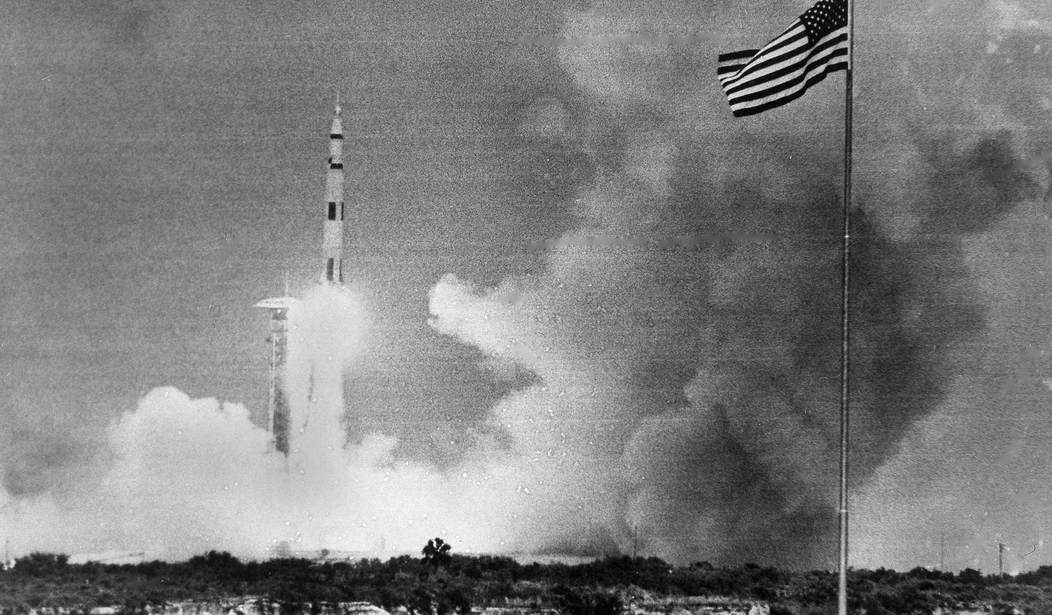July 20, 2019 marks a pivotal moment in the history and future of the United States. Fifty years ago, America achieved a feat that many at the time thought was possible. Through our ingenuity, determination, and grit, the United States made history by safely launching the Apollo 11 rocket. The mission, a resounding success, would bring the first astronauts to the moon, heralding American victory in the space race and the beginning of a new era.
The Apollo 11 anniversary is certainly a momentous occasion worthy of celebration. But more than that, the event must remind America to take its place as the global leader in spacefaring initiatives. Unfortunately, this duty is one that the U.S. government appears to have forgotten—and America is undoubtedly worse off for it. Space is the high ground around our planet, and is becoming ever more contested as China, India and other nations stake their claims to it.
A half-century after the Apollo 11 launch, America’s edge in space is dulled. The United States, once considered the undisputed leader in aerospace technology, now struggles to keep pace with the likes of China and Russia. Just five decades out from the height of America’s preeminence in space, why is the U.S. space program currently at risk? And all the more importantly: what can be done about it?
After the Apollo 11 mission, just 10 more NASA astronauts would get the opportunity to walk on the moon’s surface. On December 14, 1972, Eugene Cernan was the final man afforded the chance; America has not returned the moon since.
In the years following the collapse of the Soviet Union in 1991, the United States stood alone as the undisputed leader in space. The threat of an external force vanquished, America could finally breathe easy. Unfortunately, within our government, that comfort eventually became complacency, and for some, their complacency turned to hostility. As the memory of the Cold War has faded from America’s collective conscious, so too has the desire to protect America’s space program from the harmful effects of partisan politics.
Indeed, the biggest threat to America’s space program is no longer a competitor nation, but our country’s own political gamesmanship.
The United States’ space initiatives, once a beacon of bipartisan cooperation, have become anything but. Most recently, the Democrat-led House of Representatives passed a version of the National Defense Authorization Act (NDAA) along a strict party-line vote. The bill, opposed by both the White House and the Senate, imposes a slew of useless progressive amendments. They include a provision to prevent the DoD from spending money on Trump properties, as well as an addendum preventing the president from holding military parades for political purposes. What does either have to do with strengthening our Defense-related space capabilities? It seems that the Democrats in Congress are more interested in playing politics than they are in passing legitimate policy.
Even America’s space program isn’t safe from this corrosive politicking. The National Security Space Launch (NSSL), America’s foremost space program, was designed to shed the inertia holding back the country’s spacefaring technology. In August, the program will move forward to select two domestic aerospace companies, tasking them to carry out an array of national security space missions from 2020 to 2024. The move represents a dramatic step forward for America’s space program. But the NSSL’s promise of spacefaring advancement may soon be stymied by Democrats in Congress.
Included within the defense bill are a number of substantial changes to the NSSL program. Most notably, the House’s version of the NDAA would alter the NSSL’s selection process for choosing domestic launch providers. In the name of “fairness”—the Left’s preferred lexicon for instituting harmful government policies—House Democrats mandated that the NSSL’s launch competition be reopened after 29 launches. That way, those contractors not chosen initially would get another chance to compete.
The Air Force—the branch of the military responsible for the NSSL program—strongly opposes these proposed changes. Not only would the alterations diminish the competitive nature of the NSSL, but they would also make program management functionally impossible. To properly prepare for launches, the Air Force must operate on a strict and predictable schedule. The NDAA’s changes would force the program to stop mid-way through to reconfigure its launch providers, making any sort of long-term planning wholly impractical.
These practical considerations, though, mean little to political operatives pushing a particular agenda. Evidenced by the blatant partisanship of the NDAA, Congressional Democrats appear far more interested in advancing their specific ideology than they do assuring America’s national security or access to space. Tragically, this political maneuvering only serves to weaken America’s space program at a time when it desperately needs to progress.
Let the 50th anniversary of the Apollo 11 mission be a solemn reminder to those seeking to politicize the NSSL: As it stands, the United States’ space program is at risk. We must reclaim our place as a leader in spacefaring technology. But to do that, America must put partisanship aside, moving forward with the NSSL to strengthen our leadership in space.









Join the conversation as a VIP Member